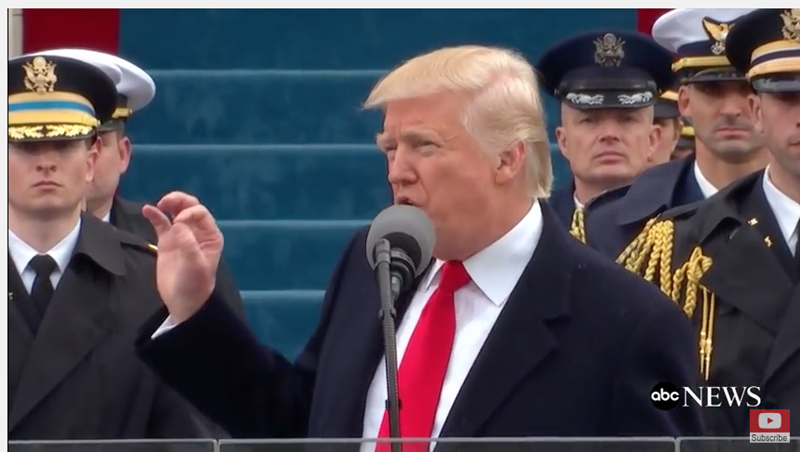
Donald Trump’s inaugural address was a powerful, straightforward articulation of American nationalism: “At the center of this movement is a crucial conviction: that a nation exists to serve its citizens. . . . From this day forward, a new vision will govern this land. From this moment on, it’s going to be America First. Every decision on trade, on taxes, on immigration, on foreign affairs will be made to benefit American workers and American families.”
These words did not go down well with those who have come to think that America exists to be the dumping ground for surplus Mexican labor and artificially devalued Chinese imports. They especially did not go down well with those who have profited from the current arrangement that drives down wages for those who need to compete against immigrant labor and foreign goods but rewards those insulated from such competition, including all the politicians who go to Washington and never leave, all the media personalities used to telling Americans what they are allowed to think, all the professors used to indoctrinating their students in cultural Marxism, and all the denizens of the vast federal bureaucracy. The screech of the privileged could be heard in virtually all the reporting on Trump’s speech. There are many examples of such screeching, but I will limit myself to two, the Washington Post‘s petulant fact-checking of Trump’s speech and the even more petulant comments of the Post’s pet conservative, George Will.
The Post‘s fact-checkers, Glenn Kessler and Michelle Ye Hee Lee, were clearly incensed by Trump’s speech, but repeatedly forced to concede that there were facts backing up Trump’s statements, even though, as they assiduously noted, they were not the type of facts that experts think should count. They took particular umbrage at Trump’s assertion that “Washington flourished, but the people did not share in its wealth. Politicians prospered, but the jobs left and the factories closed.” Yes, they admitted, the DC metro area was the richest in the country, with a median income of $93,294—nearly $40,000 above the national median income—and DC was rich because of the federal government, but “There is no empirical evidence that the D.C. area got rich off the rest of the country, as Trump suggests.” The operation of the Internal Revenue Service, which takes money from all over the country to pay the salaries of all the government employees in Washington, apparently does not count as “empirical evidence.” As for the closed factories and lost jobs, Kessler and Lee admit that the US lost 1 to 2 million manufacturing jobs after China entered the WTO, but reassure us that “economists believe the biggest factor in the decline in manufacturing is automation, not jobs going overseas.” Of course, economists also believed that letting China into the WTO wouldn’t result in the loss of hundreds of thousands of American jobs in the first place, and automation doesn’t explain why few Americans make television sets, radios, specialized machine tools, and all manner of products that once were made here and no longer are, or only in limited quantities.
Kessler and Lee also disliked Trump’s statement that “For many decades, we’ve enriched foreign industry at the expense of American industry; subsidized the armies of other countries, while allowing the very sad depletion of our own.” They write that “Trump appears to be referring to military bases that the United States has overseas,” and then note that those bases cost around $10 billion a year, which is a “mere pittance” compared to the overall defense budget of $500 billion. They do not mention the fact, though, that the United States only spends that enormous sum on defense because we have undertaken to defend dozens of countries around the world, many of which have gotten used to our continuing largesse and not a few of which have repaid that largesse by undercutting American industry, including the three nations that Kessler and Lee note have the most American bases, Germany, Japan, and South Korea.
But at least Kessler and Lee noted some facts in Trump’s favor. George Will, who wanted Trump to lose all 50 states, fumed that Trump’s speech was “The most dreadful inaugural address in history.” (One assumes Will has never read William Henry Harrison’s). Will was particularly bothered by Trump’s pledge to “Buy American and Hire American,” which is not surprising, given Will’s longstanding cheerleading for foreign manufacturers, a passion he shares with his wife, who used to lobby for Japanese car companies. Will is also bothered by Trump’s belief that “What truly matters is not what party controls our government but whether our government is controlled by the people.” One gets the sense that Will doesn’t much care for the American people who had the temerity to ignore his advice to vote against Trump in every state, but he makes no attempt to explain the difference between what Trump said and an earlier Republican president’s statement that ours was a government “of the people, by the people, for the people.”
Trump won the presidency despite the unremitting hostility of all the pundits outraged by his inaugural address. But being a successful president is a far more daunting task than being a successful candidate, and the odds are still stacked against Trump. If, though, he can indeed bring home some of the jobs and reverse some of the disastrous policies that have impoverished the parts of America Will, Kessler, and Lee know so little about, the screeching of the privileged will be as ineffectual in 2020 as it was in 2016.
[Image: screengrab from Youtube/ABC News]
Leave a Reply